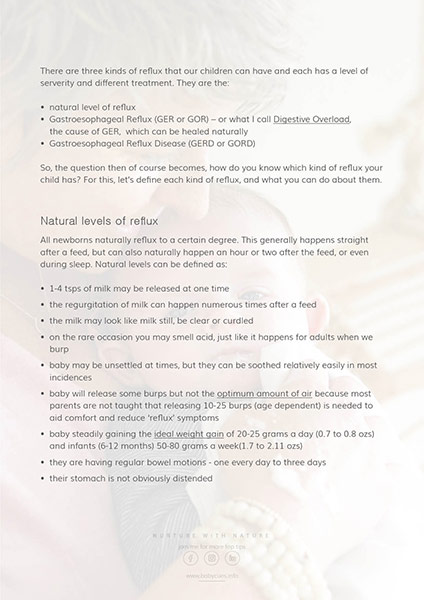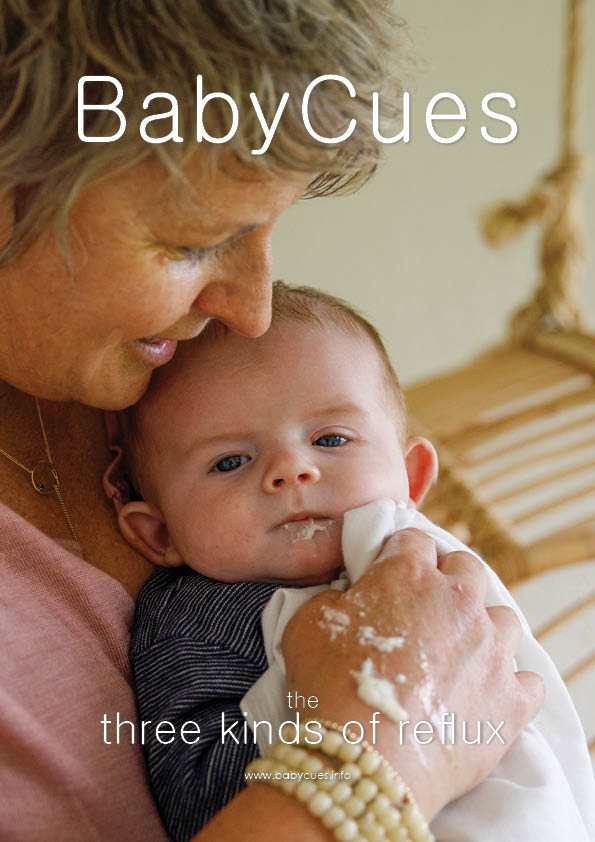What causes baby reflux?

Before you read this article, I’d like to make it clear that it is about Gastroesophaguel Reflux (GER/GOR) not Gastroesophaguel Reflux Disease (GERD/GORD). The confusion that exists on the internet these days about the difference of these two symptom lists is rife. More and more GER symptoms are being lumped together with GERD symptoms, which then leads a lot of parents down the medical path for reflux unnecessarily.
Difference between GER and GERD
If your baby is bringing up the majority of their milk after every feed and experiencing little to no weight gain then they may have GERD and medical assistance is needed. On the other hand, if baby is managing to retain the majority of their milk, having big to small posits throughout the day after each feed, while gaining steady weight (20-25 grams a day for 0-6 month olds) and have the symptoms listed here, then they have GER and the great news is, their symptoms can be healed naturally by understanding and rebalancing input and output levels.
For the remainder of this blog when I refer to reflux, or Digestive Overload, the cause of reflux, I am talking about GER/GOR.
The cause of reflux
Most parents are taught that the majority of symptoms above happen because of acid moving up the oesophagus. That baby is born with an immature digestive system, and this has the sphincter muscle at the bottom of the oesophagus allowing acid to travel upward and burn the oesophagus. With this hugely marketed belief, the acid inhibitors that many newborns are prescribed seem like a possible path of recovery to the parents. However, acid and an immature digestive system, or weak sphincter muscle, is not the cause of reflux.
Yes, that’s right. It is not the cause. I know, I know, your paediatrician said it is, your doctor said it is, most of the internet says it is and your friends on the many reflux Facebook groups say it is, but it’s not. How do I know this? Because I have healed reflux naturally for hundreds of newborns, and if it was because of an immature digestive system I wouldn’t be able to do that. Also, if it was the lack of maturity in the digestive tract then why don’t all of our newborns have reflux?
A newborns digestive system takes around two-and-a-half years before it functions the same as an adults, which is what we define as maturity. With this known, it’s fair to say that when I heal the reflux symptoms, it’s not about the digestive system suddenly maturing to a level where it can process food better, nor the sphincter muscle changing.
The three types of reflux
Unravel the confusion around reflux. Define your child's symptoms and learn the overview of treatment that could be best for them.


- Define reflux
- Symptoms for each kind of reflux
- Overview of treatment


WHAT'S INSIDE
- Define reflux
- Symptoms for each kind of reflux
- Overview of treatment
The natural remedying of reflux is possible because I work from the perspective that the newborns digestive system is perfect from birth – not immature, no lack – and that it’s up to us to learn how to nurture alongside their basic digestive capacities and capabilities from birth. Once we do this, while understanding their innate Six-Wind-Cues and how to respond to these along with their other cues, we find that reflux behaviours significantly diminish, and in most cases stop.
Sadly however, these symptoms exist because much of the mainstream teaching on feeding and burping does not nurture alongside nature. In particular the way we are now taught to feed our babies with cluster feeding, feeding baby every 0-3 hours, feeding from both breasts in one sitting, the often overlooked breastfeeding diet, or how to establish a healthy breast supply in the first week, and how to express, to name a few. Also parents are often told that newborns don’t need to burp (especially breastfed babies) that they don’t have wind, or relieving a few burps and settling baby to sleep is best practice.
Notably, the education around feeding practices have changed considerably compared to a couple of decades ago. This change has sorrowfully seen a rise in Digestive Overload behaviours for our young. All because we have been taught that the status quo of ‘demand feeding’ is being baby led, which is of course what we all want to be – baby led. But to be fully baby led we need to understand and work alongside the newborns innate digestive processes. When we do this, along with being led by their full array of ‘demand cues’, we naturally fall into a rhythm of not feeding them every time they root to suck, or are unsettled, or not sleeping as current ‘demand feeding’ education advises. Overloading the digestive system is then avoided and baby reflux can become a thing of the past.
To learn more about how to nurture alongside your child’s natural digestive biology and their full array of cues, inclusive of my discovery of the Six-Wind-Cues, feel free to read my blogs ‘The why and why not of cluster feeding’ and ‘The witching hour – it is not normal’.
These articles include the science behind my findings.
Summary
Our newborns are crying out for change! Quite simply, Digestive Overload (which is the cause of not only reflux, but also colic and lactose and dairy overload) does not need to be happening for our newborns and I will shout this from the roof tops loudly, until the day I die for the sake of our newborns. Despite the fact that it is largely contrary to the existing beliefs, marketing and some of the medical advice. Our children want to be heard and understood on a level that allows them to relax, to feel better and have their parents relax. Thus enabling the growth of their intuition, which can only flourish from a stable foundation of knowledge.




 Submitting data
Submitting data
